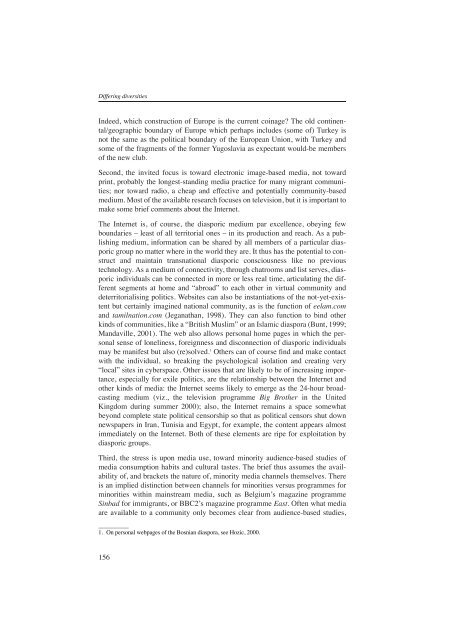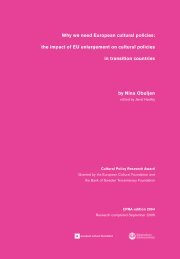<strong>Differing</strong> <strong>diversities</strong>Indeed, which construction <strong>of</strong> <strong>Europe</strong> is the current coinage? The old continental/geographicboundary <strong>of</strong> <strong>Europe</strong> which perhaps includes (some <strong>of</strong>) Turkey isnot the same as the political boundary <strong>of</strong> the <strong>Europe</strong>an Union, with Turkey andsome <strong>of</strong> the fragments <strong>of</strong> the former Yugoslavia as expectant would-be members<strong>of</strong> the new club.Second, the invited focus is toward electronic image-based media, not towardprint, probably the longest-standing media practice for many migrant communities;nor toward radio, a cheap and effective and potentially community-basedmedium. Most <strong>of</strong> the available research focuses on television, but it is important tomake some brief comments about the Internet.The Internet is, <strong>of</strong> course, the diasporic medium par excellence, obeying fewboundaries – least <strong>of</strong> all territorial ones – in its production and reach. As a publishingmedium, information can be shared by all members <strong>of</strong> a particular diasporicgroup no matter where in the world they are. It thus has the potential to constructand maintain transnational diasporic consciousness like no previoustechnology. As a medium <strong>of</strong> connectivity, through chatrooms and list serves, diasporicindividuals can be connected in more or less real time, articulating the differentsegments at home and “abroad” to each other in virtual community anddeterritorialising politics. Websites can also be instantiations <strong>of</strong> the not-yet-existentbut certainly imagined national community, as is the function <strong>of</strong> eelam.comand tamilnation.com (Jeganathan, 1998). They can also function to bind otherkinds <strong>of</strong> communities, like a “British Muslim” or an Islamic diaspora (Bunt, 1999;Mandaville, 2001). The web also allows personal home pages in which the personalsense <strong>of</strong> loneliness, foreignness and disconnection <strong>of</strong> diasporic individualsmay be manifest but also (re)solved. 1 Others can <strong>of</strong> course find and make contactwith the individual, so breaking the psychological isolation and creating very“local” sites in cyberspace. Other issues that are likely to be <strong>of</strong> increasing importance,especially for exile politics, are the relationship between the Internet andother kinds <strong>of</strong> media: the Internet seems likely to emerge as the 24-hour broadcastingmedium (viz., the television programme Big Brother in the UnitedKingdom during summer 2000); also, the Internet remains a space somewhatbeyond complete state political censorship so that as political censors shut downnewspapers in Iran, Tunisia and Egypt, for example, the content appears almostimmediately on the Internet. Both <strong>of</strong> these elements are ripe for exploitation bydiasporic groups.Third, the stress is upon media use, toward minority audience-based studies <strong>of</strong>media consumption habits and cultural tastes. The brief thus assumes the availability<strong>of</strong>, and brackets the nature <strong>of</strong>, minority media channels themselves. Thereis an implied distinction between channels for minorities versus programmes forminorities within mainstream media, such as Belgium’s magazine programmeSinbad for immigrants, or BBC2’s magazine programme East. Often what mediaare available to a community only becomes clear from audience-based studies,__________1. On personal webpages <strong>of</strong> the Bosnian diaspora, see Hozic, 2000.156
Reasearch position paper 6while a few studies focus mainly on the production side <strong>of</strong> minority media. Thereappears to be no central information point within <strong>Europe</strong> where up-to-date data onminority media is maintained. This report tries to stay close to audience practices,although the lack <strong>of</strong> attention to minority media production is raised in the conclusion<strong>of</strong> this paper.A fourth, but methodological, point, is that this paper is a review <strong>of</strong> available literaturecollected within a rather short space <strong>of</strong> time. As a highly generalisedassessment, there is a burgeoning interest in diasporic media and transnationalcommunities 1 but a comparative dearth <strong>of</strong> empirically based studies.What exists is very fragmented. Across the seven countries included in the project,there is unequal attention to these issues, with a considerable amount <strong>of</strong> policy-orienteddebate about multiculturalism in Canada and the United Kingdom, in comparison,say, to the historically strong assimilationist orientation <strong>of</strong> the Frenchstate. Some <strong>of</strong> the key issues are not so new, and in many countries, such as theUnited Kingdom, there exists a considerable historical trajectory <strong>of</strong> research onethnic minority media and ethnic minority audiences 2 on which current work canbuild. There is a particularly strong contemporary research focus on Turks andNorth Africans, then on Asians, as key migrant groups in <strong>Europe</strong>. Other academicwork has a similar set <strong>of</strong> concerns but examines countries beyond the purview <strong>of</strong>this report (Husband, 1994; Jakubowicz, 1995). Other work focuses mainly ontraining issues for ethnic minorities, again somewhat beyond the scope <strong>of</strong> thiswork (Ouaj, 1999; Aitchison, 1999).This report makes no claim to have scoped all the work on the subject. I did try tolocate known researchers in this field to solicit their work as well as further names<strong>of</strong> colleagues elsewhere conducting relevant research, and would like to thank allthose academics that responded to my request. Academic and media-related siteson the Internet were not particularly fruitful resources.The current contextIt goes without saying, but needs to be said, that the media environment <strong>of</strong> <strong>Europe</strong>has changed radically over the past decade. This is due primarily to the rapidlychangingtechnologies <strong>of</strong> media diffusion, shifting from solely terrestrially-basedinfrastructures to satellite delivery; from comparative channel scarcity to the multiplicity<strong>of</strong>fered by fibre optics and broad-band; and from analogue to digital signals.The processes <strong>of</strong> digitalisation, policy liberalisation and convergence <strong>of</strong>broadcasting and telecommunications are still being worked out in different waysin different <strong>Europe</strong>an countries, as well as institutionalised within <strong>Europe</strong>anUnion policy. Beyond <strong>Europe</strong>, these processes have also helped to transform themedia landscapes <strong>of</strong> Asia and the Middle East where significant media productionis taking place.__________1. See, for example, Dayan, 1998; Karim, 1998; Sinclair and Cunningham, 2000; Silverstone, 2000.2. For example, Cottle, 1997, and Gillespie, 1994.157
- Page 5 and 6:
PrefaceThe present text constitutes
- Page 7:
Part IDiffering diversities:transve
- Page 11 and 12:
The study: background, contextand m
- Page 13 and 14:
Transversal study on the theme of c
- Page 15:
Transversal study on the theme of c
- Page 18:
Differing diversitiesi. new forms o
- Page 23 and 24:
IntroductionTransversal perspective
- Page 25 and 26:
Transversal study on the theme of c
- Page 27 and 28:
The challenge of diversityCulture,
- Page 29 and 30:
Transversal study on the theme of c
- Page 31 and 32:
Transversal study on the theme of c
- Page 33 and 34:
Diversity, citizenship, and cultura
- Page 35 and 36:
Transversal study on the theme of c
- Page 37:
Transversal study on the theme of c
- Page 40 and 41:
Differing diversitieslanguages. The
- Page 42 and 43:
Differing diversitiesprogrammes int
- Page 45 and 46:
Culture, government and diversity:p
- Page 47 and 48:
Transversal study on the theme of c
- Page 49 and 50:
Transversal study on the theme of c
- Page 51 and 52:
Transversal study on the theme of c
- Page 53:
Transversal study on the theme of c
- Page 56 and 57:
Differing diversitiesin the pursuit
- Page 58 and 59:
Differing diversitiesthe need for m
- Page 60 and 61:
Differing diversitiescircumstances
- Page 62 and 63:
Differing diversitiesclasses artist
- Page 64 and 65:
Differing diversitiesMy point, then
- Page 66 and 67:
Differing diversitiesiii. that the
- Page 69:
Transversal study on the theme of c
- Page 73 and 74:
The consequences of European media
- Page 75 and 76:
Reasearch position paper 1and contr
- Page 77 and 78:
Reasearch position paper 1directly
- Page 79 and 80:
Reasearch position paper 1There hav
- Page 81 and 82:
Reasearch position paper 1presence
- Page 83 and 84:
Reasearch position paper 1Strategic
- Page 85 and 86:
Reasearch position paper 1New media
- Page 87 and 88:
Reasearch position paper 1Blumler,
- Page 89 and 90:
Reasearch position paper 1Hoffmann-
- Page 91 and 92:
Reasearch position paper 1Pauwels,
- Page 93 and 94:
Assessing the implementationof cult
- Page 95 and 96:
Reasearch position paper 2tics abou
- Page 97 and 98:
Reasearch position paper 2Act (GPRA
- Page 99 and 100:
Reasearch position paper 2factually
- Page 101 and 102:
Reasearch position paper 2The evalu
- Page 103 and 104:
Reasearch position paper 2capacity
- Page 105 and 106: Reasearch position paper 2Luchtenbe
- Page 107 and 108: The cultural policies of the Europe
- Page 109 and 110: Reasearch position paper 3went, wou
- Page 111 and 112: Reasearch position paper 3The histo
- Page 113 and 114: Reasearch position paper 3integrati
- Page 115 and 116: Reasearch position paper 3of differ
- Page 117 and 118: Reasearch position paper 3European
- Page 119 and 120: Reasearch position paper 3voice to
- Page 121: Reasearch position paper 3Howe, Mar
- Page 124 and 125: Differing diversitiesContemporary d
- Page 126 and 127: Differing diversitiesWhereas in the
- Page 128 and 129: Differing diversitiesbuilding on th
- Page 130 and 131: Differing diversitieswhen tackling
- Page 132 and 133: Differing diversitiesand that is pr
- Page 134 and 135: Differing diversitiesSennett, Richa
- Page 136 and 137: Differing diversitiesallowing their
- Page 138 and 139: Differing diversitiesNevertheless,
- Page 140 and 141: Differing diversitiesgrowth also ex
- Page 142 and 143: Differing diversitiesAt a deeper le
- Page 144 and 145: Differing diversitiesconventional c
- Page 146 and 147: Differing diversitiesworks, and the
- Page 148 and 149: Differing diversitiesNational sover
- Page 150 and 151: Differing diversitiesSimilarly, at
- Page 152 and 153: Differing diversitiesCoombe, Rosema
- Page 154 and 155: Differing diversitiesWoodmansee, Ma
- Page 158 and 159: Differing diversitiesThe second maj
- Page 160 and 161: Differing diversitiesexample by Hol
- Page 162 and 163: Differing diversitiesincreased broa
- Page 164 and 165: Differing diversities“Black Carib
- Page 166 and 167: Differing diversitiesBunt, Gary, 19
- Page 169 and 170: Preserving cultural diversity throu
- Page 171 and 172: Reasearch position paper 7unique, t
- Page 173 and 174: Reasearch position paper 7legislati
- Page 175 and 176: Reasearch position paper 7appropria
- Page 177 and 178: Reasearch position paper 7Indeed, m
- Page 179 and 180: Reasearch position paper 7- means t
- Page 181 and 182: Reasearch position paper 7cyberspac
- Page 183 and 184: Reasearch position paper 7extended
- Page 185 and 186: Reasearch position paper 7It is rec
- Page 187 and 188: Reasearch position paper 7lose loca
- Page 189 and 190: Reasearch position paper 7six proje
- Page 191 and 192: Reasearch position paper 7and innov
- Page 193 and 194: Reasearch position paper 7Programme
- Page 195 and 196: Reasearch position paper 7Reference
- Page 197 and 198: Reasearch position paper 7Papers on
- Page 199: Reasearch position paper 7Swaminath
- Page 202: Sales agents for publications of th














